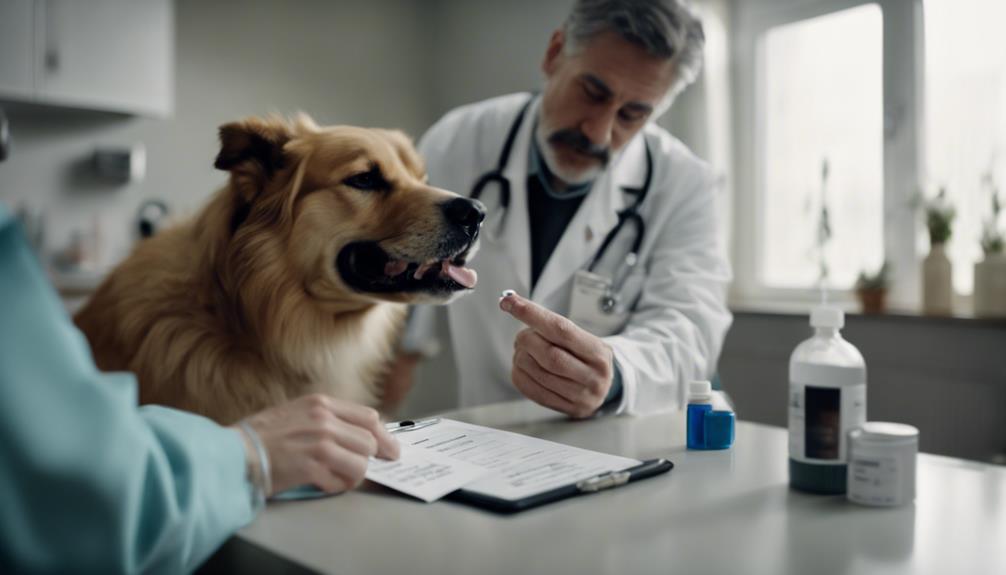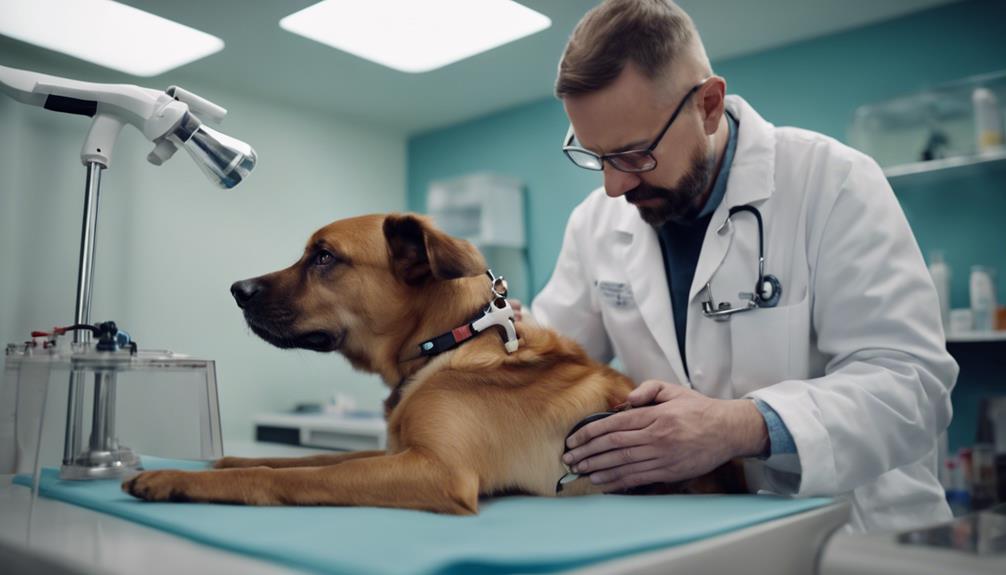The presence of blood in a dog's urine, known as hematuria, can be an alarming sign for pet owners. Understanding the underlying causes and appropriate treatment options is crucial for the well-being of our furry companions.
From urinary tract infections to more serious conditions, hematuria can stem from various issues that necessitate veterinary attention. By recognizing the symptoms and taking proactive steps, pet owners can ensure their dogs receive the necessary care to address this concerning issue.
Key Takeaways
- Hematuria in dogs can result from various urinary or reproductive issues.
- Symptoms include red urine, straining, and lethargy, signaling potential health concerns.
- Diagnosis involves tests like urinalysis, X-rays, and ultrasound to pinpoint the cause.
- Treatment options range from antibiotics for infections to surgery for bladder stones or cancer.
Causes of Hematuria in Dogs
Hematuria in dogs can stem from various underlying causes within the urinary tract or reproductive system. Common sources of blood in a dog's urine include urinary tract infections, bladder stones, trauma, cancer, and blood clotting disorders.
Infections can lead to inflammation and irritation, resulting in blood in the urine. Bladder stones may cause damage to the bladder lining, leading to bleeding. Trauma, such as injury or physical stress, can also result in hematuria. Additionally, cancer affecting the urinary tract or reproductive organs can manifest with blood in the urine. Blood clotting disorders can contribute to abnormal bleeding within the urinary system.
Identifying the specific cause of hematuria is crucial for developing an appropriate treatment plan for affected dogs.
Hematuria Symptoms and Diagnosis
Symptoms of hematuria in dogs can serve as crucial indicators prompting further diagnostic investigations to determine the underlying cause. When observing hematuria in your dog, it is important to pay attention to the following symptoms:
- Red or pink urine
- Straining to urinate
- Increased frequency of urination
These signs, along with other potential symptoms such as lethargy and loss of appetite, warrant a thorough evaluation by a veterinarian. Identifying these manifestations early can lead to a more accurate diagnosis and timely intervention to address the underlying issue causing the hematuria in your dog.
Hematuria Diagnostic Procedures

Diagnostic procedures for hematuria in dogs typically involve a series of tests to pinpoint the exact cause of the blood in the urine. These tests may include:
- Urinalysis to examine the urine for abnormalities such as the presence of red blood cells, white blood cells, or bacteria.
- Blood tests to help assess the overall health of the dog and check for conditions like kidney disease or clotting disorders.
- X-rays and ultrasound imaging, which are valuable in visualizing the urinary tract and identifying any structural abnormalities like stones or tumors.
- In more complex cases, a cystoscopy may be performed to directly visualize the inside of the bladder or urethra, aiding in the diagnosis of conditions such as polyps or bladder cancer.
Hematuria Treatment Options
After pinpointing the underlying cause of blood in your dog's urine through diagnostic procedures, the next step involves considering appropriate treatment options tailored to address the specific condition identified. Depending on the cause of hematuria, treatment options may vary.
- Medication: Prescription medications can help manage underlying conditions like infections or blood clotting disorders.
- Surgery: In cases where bladder stones or tumors are present, surgical intervention may be necessary for removal.
- Chemotherapy: If cancer is the cause of hematuria, chemotherapy may be recommended to treat the condition effectively.
Antibiotics for Urinary Tract Infections

Antibiotics play a crucial role in the treatment of urinary tract infections in dogs, targeting the underlying bacterial causes to alleviate the condition effectively. When a urinary tract infection is suspected, a veterinarian will typically prescribe antibiotics based on the specific bacteria identified through urine culture and sensitivity tests. Commonly used antibiotics for UTIs in dogs include amoxicillin, cephalexin, and enrofloxacin.
It is essential to administer the antibiotics as prescribed and for the full duration to ensure the infection is completely eradicated. Failure to complete the full course of antibiotics can result in recurring or resistant infections. Regular follow-up appointments with the veterinarian may be necessary to monitor the dog's progress and adjust the treatment plan if needed.
Surgical Treatment for Bladder Stones
Utilizing advanced surgical techniques, the removal of bladder stones in dogs is a crucial intervention to alleviate discomfort and prevent further complications in affected animals. Bladder stones, also known as uroliths, can cause pain, urinary obstruction, and potentially life-threatening conditions if left untreated.
Surgical treatment options for bladder stones in dogs include:
- Cystotomy: A surgical procedure to remove stones from the bladder.
- Laser lithotripsy: Using laser technology to break down stones for easier removal.
- Minimally invasive techniques: Such as laparoscopic or robotic-assisted surgery to reduce recovery time and post-operative discomfort.
These surgical interventions aim to ensure the complete removal of stones and restore normal urinary function in dogs suffering from bladder stones.
Chemotherapy for Cancer

Chemotherapy is a systemic treatment approach commonly employed in veterinary oncology to combat cancer in dogs by targeting and inhibiting the growth of malignant cells. This treatment is particularly useful in cases where surgery or radiation therapy alone may not be sufficient to eliminate cancer cells. Chemotherapy drugs work by disrupting the rapid division of cancer cells, ultimately leading to their destruction.
While chemotherapy can be effective in shrinking tumors and extending the quality of life for dogs with cancer, it can also have side effects such as nausea, vomiting, and decreased white blood cell count. The specific chemotherapy protocol and duration will vary depending on the type and stage of cancer, as well as the overall health status of the dog.
Medications for Blood Clotting Disorders
In cases where dogs with cancer may develop blood clotting disorders as a side effect of chemotherapy treatment, medications that address these disorders play a crucial role in managing their health and overall well-being. These medications are essential in controlling abnormal blood clotting and preventing further complications.
Medications for Blood Clotting Disorders:
- Anticoagulants like heparin or warfarin help prevent excessive blood clot formation.
- Antiplatelet drugs such as aspirin inhibit platelet aggregation, reducing clotting risk.
- Clot-busting medications like tissue plasminogen activator (tPA) can dissolve blood clots in emergency situations.
Proper administration of these medications under veterinary guidance is vital to effectively manage blood clotting disorders in dogs undergoing cancer treatment.
Dietary Changes for Hematuria

To address hematuria in dogs, implementing appropriate dietary changes plays a significant role in managing the condition effectively. A diet tailored for dogs with hematuria should focus on promoting urinary tract health and reducing inflammation.
Foods rich in antioxidants, such as blueberries and cranberries, can help support bladder health and reduce the risk of urinary tract infections. Increasing water intake through wet food or adding water to dry kibble can also help dilute urine and prevent crystal formation.
Additionally, reducing the intake of foods high in purines, like organ meats, can help prevent the formation of bladder stones. Consulting with a veterinarian to create a specialized diet plan based on your dog's specific needs is crucial for effectively managing hematuria through dietary modifications.
Preventing Hematuria in Dogs
Implementing proactive measures to prevent hematuria in dogs is essential for maintaining their urinary tract health and overall well-being.
To prevent hematuria in dogs:
- Provide access to fresh water at all times to promote proper hydration.
- Maintain a healthy weight through a balanced diet and regular exercise routine.
- Schedule regular veterinary check-ups to monitor your dog's urinary tract health and address any potential issues promptly.
Managing Hematuria Recurrence

Effectively managing the recurrence of hematuria in dogs requires diligent monitoring and proactive measures to prevent future episodes. After an initial episode of hematuria, it is essential to work closely with your veterinarian to identify the underlying cause and implement appropriate treatment.
Regular follow-up appointments and monitoring of your dog's urinary habits and overall health are crucial in detecting any signs of recurrence early on. Maintaining a healthy lifestyle for your dog, including a balanced diet, regular exercise, and access to fresh water, can help prevent future occurrences of hematuria.
Additionally, following any specific recommendations provided by your veterinarian, such as administering medications or implementing dietary changes, is key to managing and reducing the likelihood of hematuria recurrence in your canine companion.
Related Topics and Articles
Upon exploring related topics and articles, a comprehensive understanding of various aspects of canine health and care can be gained.
- Understanding UTIs in dogs can shed light on urinary tract issues.
- Exploring urinary health products can aid in maintaining your dog's urinary system.
- Learning about separation anxiety in dogs can help address stress-related urinary issues.
These related topics can provide valuable insights into various factors that may contribute to hematuria in dogs. By delving into these subjects, dog owners can enhance their knowledge and better understand how to support their pet's urinary health.
Consultation With a Veterinarian

As a responsible pet owner, seeking guidance from a veterinarian upon noticing blood in your dog's urine is essential for proper diagnosis and treatment. Veterinarians are trained to evaluate the underlying causes of hematuria in dogs through a series of diagnostic tests, including urinalysis, blood tests, imaging studies like X-rays and ultrasound, and even cystoscopy if necessary.
Through a thorough examination, a veterinarian can determine if the blood in your dog's urine is due to infections, urinary tract stones, cancer, or other serious conditions. Prompt consultation with a vet is crucial as they can recommend appropriate treatment options such as antibiotics for infections, surgery for bladder stones, or chemotherapy for cancer. Trusting professional expertise ensures your dog receives the best possible care for their condition.
Conclusion
In conclusion, the presence of blood in a dog's urine, known as hematuria, can indicate various underlying health issues that require prompt attention.
Recognizing the symptoms, conducting diagnostic procedures, and implementing appropriate treatment options are crucial steps in managing hematuria in dogs.
By focusing on prevention strategies and regular veterinary check-ups, pet owners can effectively address this concerning issue and ensure the well-being of their canine companions.




